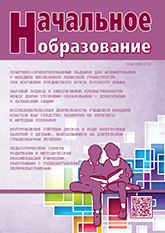Volgograd, Volgograd, Russian Federation
CSCSTI 14.15
CSCSTI 14.25
The article discusses the problem of the discrepancy between the logic of constructing the content of the subjects of the natural science cycle for the most sensitive periods of development of modern children of primary school age, which hinders the physically substantiated understanding of the phenomena of the surrounding world by students, the formation of scientific thinking and cognitive experience, and does not meet their cognitive interests. Resolution of this problem the author sees in the use of elective courses on which there is an earlier acquaintance of younger schoolchildren with the physical principles and which is a basis for all natural phenomena and actions of technical systems. The technique developed by the author for conducting a propaedeutic elective “On the way to physics” for pupils of the fourth grade, suggesting the possibility of sensory perception by children of the actions of physical laws, active participation in experiments, mini-studies is described. An analysis of the results of the elective has shown that this methodological approach allows to ensure continuity in the teaching of the physics course between the primary and secondary levels of schooling, to increase the general level of training of the primary school graduate.
subjects of the natural science cycle; the logic of constructing content in a comprehensive school; a modern schoolchild; sensitive period of childhood; information rich environment; early familiarization with physical principles and laws; the formation of scientific thinking; cognitive interest; elective courses.
Серьезное внимание на занятиях в ходе факультатива уделялось методологии и методам физических исследований, разумеется на доступном для учащихся четвертых классов уровне:
– Как провести физический эксперимент?
– Как проверить свои умения: наблюдать физические явления; формулировать гипотезы; ставить опыт и анализировать его результаты; разрабатывать модели физических явлений?
1. Akvileva G.N., Klepinina Z.A. Metodika prepodavaniya estestvoznaniya v nachal’noy shkole [Methodology of teaching science in elementary school]. Moscow, Vlados Publ., 2001. 240 p.
2. Vinogradova N.F., Kulikova T.A. Deti, vzroslye i mir vokrug [Children, adults and the world around]. Moscow, Prosveshchenie Publ., 1993. 128 p.
3. Burova L.I. Formirovanie u mladshikh shkol’nikov pervonachal’noy sistemy znaniy o prirode [Formation of the initial system of knowledge about nature in younger schoolchildren]. Moscow, Prometey Publ.; Cherepovets: Pedagogicheskii gosudarstvenniy institute Publ., 1996. 123 p.
4. Kropocheva T.B. Didakticheskie igry na urokakh okruzhayushchego mira [Didactic games in the lessons of the surrounding world]. Nachal’noe obrazovanie [Primary education]. 2006, I. 2, pp. 18-26. EDN: https://elibrary.ru/OJUDJJ
5. Kropocheva T.B. Issledovatel’skie ekskursii v nachal’noy shkole [Exploratory excursions in the primary school]. Nachal’naya shkola [Primary school]. 2007, I. 11, pp. 48-53. EDN: https://elibrary.ru/IBOEBV






